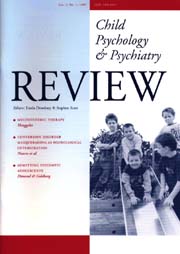No CrossRef data available.
Article contents
Abstract
In the first part of the Forum on Play, in Volume 3, Number 2, an overview of the functions of play was provided by David Pellegrini and Peter Smith, and the importance of play in the school playground was emphasised by Peter Blatchford.
In this, the second part of our forum, Anne Alvarez and Asha Phillips start us off with a masterly exposition of the importance of play in a clinical therapeutic relationship. They show how analytic thinking about play has developed, and add in a wider understanding from developmental psychology. They give vivid examples of what can happen during therapeutic sessions, and propose that if a secure relationship can be established, the child will then be safe to explore alternative ways of feeling and being, free of fear.
Allison James then brings us an anthropological perspective on play. With examples, she develops the argument that children's play is not merely a re-enactment of adult values and rules. Rather, successful play with other children is a finely tuned ‘act’ that requires sensitive attunement in order to follow the niceties of the rules and meanings that govern situations. These are complex and differ according to the context the child is in, but are specific to the child's own world and not merely generated by adults.
Finally, Peter Slade offers us a uniquely personal view of how he has used play in drama therapy with children. Reading it enables us to glimpse ways of thinking spanning his 50 years of experience.
To give a practitioner's perspective, we invited Ann Cattanach to comment on the first two reviews in the forum and Margaret Hunter to comment on the three reviews in this issue. However, if any of these reviews or commentaries sparks off opinions, reminiscences, or experiences, please write to the Editors, so they can be shared with the readership.
- Type
- Forum on Play
- Information
- Copyright
- © 1998 Association for Child Psychology and Psychiatry




